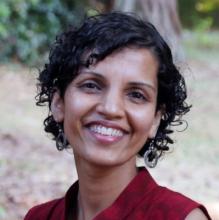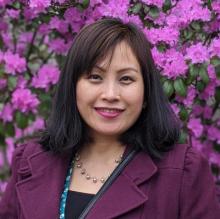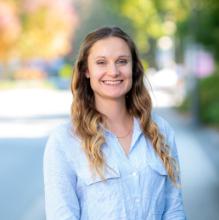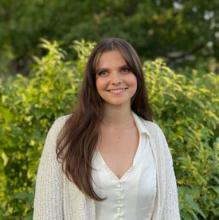Collaborating with young children and teachers, Harini explores how creative learning opportunities offer English language learners a way to illustrate their diverse capacities while strengthening their literacies. Using modalities like photography, drawing, written and oral language, Harini seeks to articulate child-centered pedagogies, and to value children’s linguistic and cultural diversity.
Research Description
My research explores the ways in which young English language learners, often immigrants and refugees, in elementary school make meaning through modes such as photography, art, play, conversations, and reading and writing in various contexts. I pay attention to the varied communicative repertoires, socio-emotional aspects, and identities that surface without depending solely on the children’s competence in English and how these impact their literacies learning. Importantly, I am interested in how these capacities may be valued in classrooms and what opportunities this valuing might offer for teaching and learning. Working collaboratively with the children and the teacher, my research seeks ways to bring multilingual, multimodal approaches to literacies in the classroom through an inquiry project. In the context of the new BC curriculum and bridging to India’s under-resourced English education context, I hope my research contributes to reflective and innovative pedagogy and policies that enable respectful engagement with children’s cultural and linguistic identities.
What does being a Public Scholar mean to you?
A public scholar bridges and translates research from academia to the public sphere for improving practice and people’s lives. Being a public scholar is also an opportunity to reflect and innovate on the ways in which knowledge is understood, created, and shared – by careful listening, collaborating, and experiencing, by building respectful and reciprocal relationships, and by reaching globally and locally. Public scholarship offers pathways for new understandings and innovative interdisciplinary solutions within the academy, and for tangible outputs and productive imaginings from and with communities.
In what ways do you think the PhD experience can be re-imagined with the Public Scholars Initiative?
The Public Scholars Initiative could be the transformation of the PhD from a place of privilege to one of responsibility, including ways of thinking about scholarship and means of dissemination of knowledge. This re-imagining allows graduate students to engage with others in more human ways, communicate ideas creatively, and facilitate meaningful action. By encouraging students to collaborate with partners and develop their strengths, the Public Scholars Initiative can craft a richer, dynamic doctoral education experience.
How do you envision connecting your PhD work with broader career possibilities?
I think of my PhD as a process of growth and learning, a privileged time to reflect on questions, gain new understandings, and collaborate with others. It is also a time that I envision as a community-oriented venture that needs reflexive thinking rather than the purely academic pursuit of a topic. In listening respectfully to community needs, teaching and learning collaboratively, being an advocate for new forms of knowledge, and acting as a facilitator between worlds, I have found new possibilities for the PhD and, hopefully, my career after.
How does your research engage with the larger community and social partners?
In my research with young children and teachers in the Vancouver School Board, I examine the connections between the cultures of the children’s two major learning spaces – home and school – and explore some ways for the children to negotiate these cultures to their advantage. Positioned within the context of BC’s new curriculum, I hope to understand aspects of teaching, learning, communication, inclusion, and diversity for not only English language learners but everyone in the classroom and the broader community. My research methodology involves learning from the children, their families and cultures; collaborative and creative constructions; and discussion and reflexive perspectives on all aspects of the inquiry. Through the Public Scholars Initiative, I am also able to expand my work to an international context and propose a related set of creative literacy projects in India. These projects, in collaboration with Nalandaway (https://www.nalandaway.org/), can reach out to a greater number of children and teachers and explore new resources and ideas. Working in participatory ways with children and teachers in severely under-resourced contexts offers a way to explore real-world issues and increase the relevance of this type of research for education policy and practice, locally and globally.
Why did you decide to pursue a graduate degree?
As an educator, a parent, and a lifelong learner, I am fascinated by how our cultures and identities are linked to our learning but there is a range of questions that need exploring. I believe that focused academic study can provide a support for me to understand and examine these questions further, and feel fortunate that I can refine and work on these questions through my professional and personal learnings as a graduate student.
Why did you choose to come to British Columbia and study at UBC?
UBC was a natural choice for me since I now live in Vancouver with my family. However, I chose UBC also because of my department’s excellent scholarship and its commitment to diversity and social justice. By providing a space for likeminded scholars to work collectively on local and global issues, there is space for inventiveness. I am grateful to my advisors Dr. Jim Anderson and Dr. Maureen Kendrick for their inspiration and mentorship.
In the context of the new BC curriculum and bridging to India’s under-resourced English education context, I hope my research contributes to reflective and innovative pedagogy and policies that enable respectful engagement with children’s cultural and linguistic identities.





